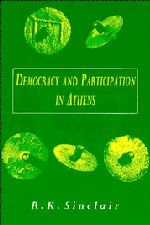Book contents
- Frontmatter
- Contents
- Preface
- Maps
- 1 The Athenian polis and the evolution of democracy
- 2 The privileges and the opportunities of the citizen
- 3 The responsibilities of the citizen
- 4 The sovereignty of the Demos, officials and the Council
- 5 Citizens and participation
- 6 The hazards of leadership
- 7 The rewards of leadership
- 8 The critics of Athenian democracy
- Appendix 1 The population of Athens
- Appendix 2 ‘Working days’
- Appendix 3 Notes on three constitutional matters
- Bibliography
- Index
- Frontmatter
- Contents
- Preface
- Maps
- 1 The Athenian polis and the evolution of democracy
- 2 The privileges and the opportunities of the citizen
- 3 The responsibilities of the citizen
- 4 The sovereignty of the Demos, officials and the Council
- 5 Citizens and participation
- 6 The hazards of leadership
- 7 The rewards of leadership
- 8 The critics of Athenian democracy
- Appendix 1 The population of Athens
- Appendix 2 ‘Working days’
- Appendix 3 Notes on three constitutional matters
- Bibliography
- Index
Summary
In the period from the middle of the fifth century to 322 b.c. the affairs of Athens were determined by a system of direct democracy involving thousands of citizens in the assembly, the courts and other institutions. The idea of participation or sharing is central to Greek thought and writing about citizenship and political life. Aristotle identified the distinguishing feature of a citizen as the possession of the right to participate in the exercise of power – in the courts, in the assembly, and in the offices of state. That definition of a citizen, he argued, applied especially to citizenship in a democracy.
The centrality of participation in the concept of citizenship is reflected in the lofty rhetoric of Perikles (as reported by Thucydides):
We find it possible for the same people to attend to private affairs and public affairs as well, and notwithstanding our varied occupations to be adequately informed about public affairs. For we are unique in regarding the man who does not participate in these affairs at all not as a man who minds his own business, but as useless. We ourselves decide matters or submit them to proper consideration, taking the view that debate is not harmful to action, but rather that it is harmful not to be informed, through discussion, before we proceed to take the necessary action.
Yet even Perikles' words imply that some Athenians were ‘useless’. Three generations later, Demosthenes painted a very different picture from Perikles' vision.
- Type
- Chapter
- Information
- Democracy and Participation in Athens , pp. xi - xiiPublisher: Cambridge University PressPrint publication year: 1988

